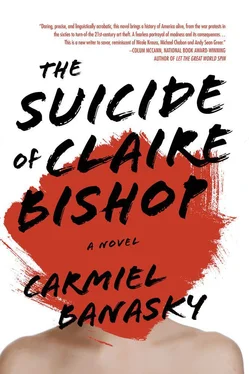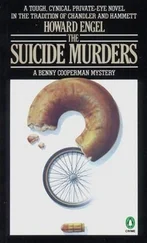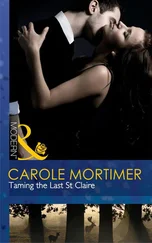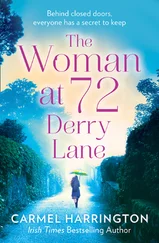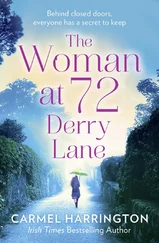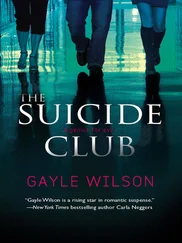The change in Claire must have been glaring and Samantha stopped short. “What’s wrong, dear? Does it hurt?”
Somehow Claire managed to say, “Where did you get it?” She pointed at the painting, arm extended, a rope pulling her taught, keeping everything in place.
“I don’t know?” Samantha answered before she registered what exactly it was Claire was referring to. With her eyes, she followed Claire’s finger. “Oh. That. Yes, in your basement. Yes, that’s right. It was in Freddie’s things when we moved him out. Hidden behind boxes like it was junk. I figured he wouldn’t mind, but I never asked him, exactly. Not directly. Was that bad of me? It was too strange and rare to keep locked away like that. It’s by that portrait artist, you know, she’s quite a name now—”
Claire stared her into silence. Samantha stood with the rag and bandage, waiting. The stupid woman. “Can’t you see it’s me?” Claire said desperately.
“What do you mean?” Samantha’s eyes moved up and down the painting. “No. Stand next to it.” Claire obeyed, rising and walking slowly from the couch, but both women knew it was unnecessary. Samantha’s lips parted, moving her gaze from Claire to the painting and back again. “It is you. Where has the corner gone?”
Claire moved to the window. She stared out at the seagulls, now at eye level, still dancing, or mating, or fighting. “It’s mine,” she whispered to the window, the seagulls. Seagulls, ocean-tugged. And the ocean was calling her, too. She thought, for just a moment, that one bird paused to look in her direction, an acknowledgment.
Below. Claire looked below to see that the world was still throbbing. It hadn’t stopped at her departure. Like the sea, she’d drown in it if she let it in. She barely knew. She barely knew anything about the sea, as she barely knew anything about what she’d been protesting. She felt faint, uncertain how she’d gotten here. The marchers on the street flooding the pavement and rising high, the sweaty glass playing tricks on her eyes, the strata of shadows. All the people fighting. Fighting with police in riot gear who had appeared on the sidewalks. From here they were like rows of toy soldiers aligned by a boy’s small hand. Fighting for room to walk. Fighting with the day, the cold sun. All these people fighting. All these people dreamed at night.
She turned back to Samantha and said, “It’s mine.”
Samantha tensed. She made herself tall and spoke slowly. “Freddie must have paid good money.”
Claire peered at Samantha as if for the first time that day. She was stunning with her bouffant hairdo and Grace Kelly pout. Brilliant, too, though she rarely let that on. No wonder she had everything. And she never seemed afraid of losing it all, though the possibility perhaps had never crossed her mind. Claire hated her for that.
She smiled sweetly at her ex-sister-in-law. Nothing Claire could do would truly hurt Samantha, so she didn’t feel bad saying, “You’ve filled out since I last saw you, dear.”
Samantha smiled back. “Only where it counts.”
Claire made for the painting, two long strides. She ripped it down.
But she failed. It hardly budged, trapped in by nails. It hung crooked and heavy.
Samantha was still speaking. About laws and theft and morality. Unclear, like she or Claire were underwater.
Claire took the canvas on either side with both hands, lifting it calmly now, releasing it from the wall. The pain in her leg was gone. The painting was heavier than she remembered.
“You can’t do that. You can’t just take a painting from someone’s wall. It’s stealing. A thief. You’re a thief,” Samantha said, as if pleased with the conclusion she’d reached. But she didn’t move to stop the thief. Still standing in her place in the middle of the room, her hands full of bandages.
“But it’s mine.” Claire walked the painting to the couch and grabbed her bags. She headed for the door. In a way, the interaction was all very civil.
“I’ll call the police,” Samantha said behind her. “I will.”
Claire didn’t respond, she was outside the door, down the first flight of stairs. The radiator whistled a catcall. The clatter of her thin-soled shoes. Her Macy’s bag and purse cut off the circulation at her elbow and thumped against her hip. Holding the painting in front of her with both sore hands, like a wall always in close proximity.
Samantha was above her, leaning over the railing. “You’re mad, you know that?”
Claire broke out into the street, barely noting the doorman, a blur in a cap. The chanting hit her; it seemed violent now that she was no longer a part of it. But it was a gift to not hear her own thoughts. She walked south in the small space between the buildings and the backs of policemen, the canvas nearly scraping their backs, but none turned her way.
Nicolette would be proud of Claire for taking what was hers. For taking what she wanted. Perhaps the artist was here, somewhere in the protest. What if Claire ran into her? Carrying the painting like this? The thought of it made her tired. Over six years now since she’d seen Nicolette, and still Claire thought of her from time to time, thought of looking for her.
Left onto Seventieth. Ungainly with the painting, stumbling over nothing down the street, she almost fell in front of a group of schoolchildren. They stared at her and sniggered, she must look drunk to them. She tripped off the curb, not looking where she was going. She could die this instant. She could get run over by a taxi.
The fact of her body became an afterthought. If she was forced to think about it, she might forget how to walk. Old shoes, green like moss. When you cannot feel your own feet on the ground. And you feel you’ve dropped something, but know for certain you had nothing to drop.
Down Madison, mirrors and shop windows clicking by. She was walking alongside her reflection. Do not look at yourself or you will disappear. Each storefront marked a passing moment, as if the day’s clock were a straight line, slipping through another minute and another. Time passing as slow or as fast as she walked down the block.
Claire froze. To her right, a shop with display cases of blown-glass clowns and dolphins and children with balloons. Then she saw what had caught her attention: a woman was staring at her from inside the shop. Darting eyes that found and pinned her. She registered nothing but those eyes. Still familiar, still knowable after all these years. Nicolette.
A man nearly ran into Claire from behind, his briefcase scraping her buttocks then knocking the corner of the painting. She wasn’t feeling quite herself. Claire snapped her head south and walked briskly, the frame jolting against her shins. The man was tall and she followed him down the block as fast as she could. It couldn’t have been the painter. Though Claire had heard Nicolette had been involved with the Freedom Riders. Claire tried to reconstruct the face around those eyes. The woman she’d seen was older, who might have been Nicolette if Nicolette had aged twice as fast as she should. Who might be Nicolette in the future. Those lips, those perfect imperfections.
The man turned right on Sixty-Seventh, so Claire turned right as well. She was almost back at the protest on Fifth Avenue. And then the man was gone. She lost the man and her stomach sank. You lose a stranger on the street and you feel your heart break. On the corner, a group of young men were yelling at the cops, and a moment later they were gone, shoved in the back of a police van. There, the street, just two footfalls from her. There was the van, she could throw herself under it.
“Excuse me, miss.”
Claire stopped and turned to the officer who had pulled up beside her, lifting himself sluggishly from the police car.
Читать дальше
